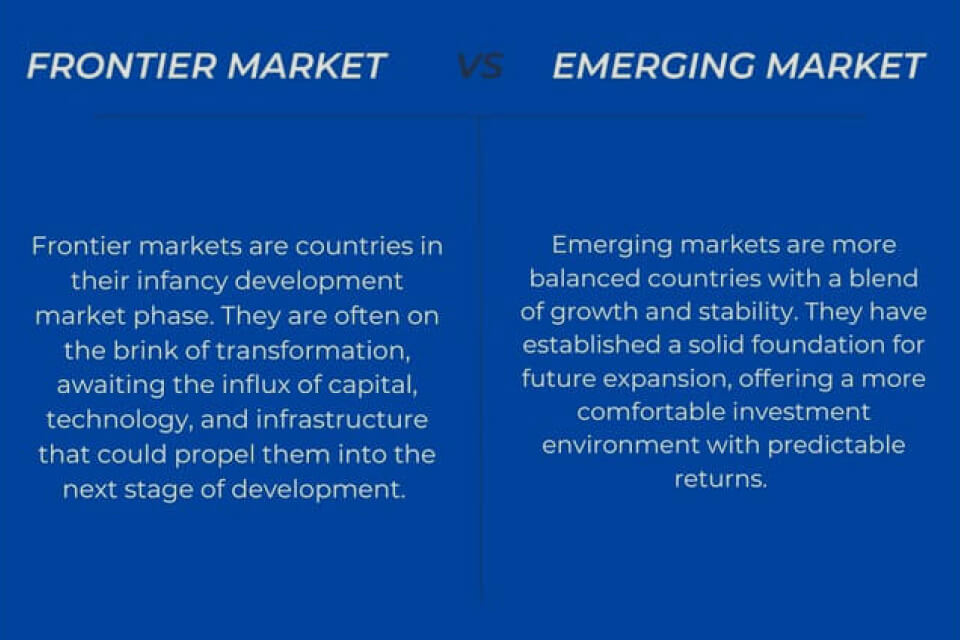- Introduction
- What are Frontier Markets? How Do They Differ from Emerging Markets?
- Mitigating Risks Associated with Frontier Markets
- Emerging Markets: A More Balanced Approach
- Investing in Emerging Markets
- Growth Opportunities in Emerging Markets
- Frontier vs Emerging Markets: Which Yields Higher ROIs?
- Lessons Learned and Best Practices
- Frequently Asked Questions (FAQs)
- Conclusion: Balancing Risk and Reward
Introduction
As a new investor, the thrill of exploring uncharted territories has always drawn people in. Frontier markets, with their promise of untapped growth and hidden gems, are particularly enticing. But navigating these waters requires a deep understanding of the risks and rewards. In this comprehensive guide, we will discuss the difference between frontier markets vs emerging markets and discuss the strategies to mitigate risk and make smart investments for maximum rewards on investment.
What are Frontier Markets? How Do They Differ from Emerging Markets?
Think of frontier markets like the Wild West of investing—they’re untamed, unpredictable, and full of hidden gems. These are countries still developing and not yet reaching the big leagues of emerging markets. They’re risky but offer the potential for huge rewards, like startups. Nigeria is a good example: its economy is still finding its footing but holds great potential.
Frontier markets can be seen as the infancy phase of market development. They are often on the brink of transformation, awaiting the influx of capital, technology, and infrastructure that could propel them into the next stage of development. The allure lies in being part of this transformation story, capturing value early, and riding the wave of growth.
On the other hand, emerging markets like South Africa are more balanced, with a blend of growth and stability. They have established a solid foundation for future expansion, offering a more comfortable investment environment with predictable returns. These markets have often undergone significant economic reforms, have better regulatory frameworks, and show higher levels of integration with global financial systems.

Characteristics of Frontier Markets
Delving into their distinctive characteristics and the unique challenges and opportunities frontier markets present is essential. Here’s a closer look:
Small but Growing Economies: Frontier markets typically have smaller economies than their emerging counterparts. Their GDP might be lower, but these markets exhibit rapid growth rates driven by booming agriculture, manufacturing, and services sectors. This growth is often uneven and can be influenced heavily by external factors such as commodity prices and geopolitical events.
Limited Investment Opportunities: Frontier markets often have fewer listed companies and lower liquidity in their stock markets. A handful of large firms dominate the investment landscape, usually state-owned enterprises or family-run conglomerates. This limited scope can both be a challenge and an opportunity—while the choices are fewer, the potential for early mover advantage is significant.
Restrictions on Foreign Investment: Many frontier markets have stringent regulations on foreign investment to protect their infant industries and maintain economic stability. These restrictions can include caps on foreign ownership, complex approval processes, and repatriation controls. Navigating these regulations requires local expertise and a strategic approach to partnership and compliance.
High-Risk, High-Reward Scenarios: Investing in frontier markets is akin to high-stakes gambling. The potential returns are substantial, but so are the risks. Political instability, economic volatility, currency fluctuations, and inadequate legal protections can impact investments significantly. However, the rewards can be commensurately high for those willing to embrace these risks.
Less Connected to Global Markets: Frontier markets often have lower levels of integration with global financial systems. This relative isolation can provide a buffer against global economic shocks but can also mean higher costs and delays in capital flows. This characteristic requires investors to have a more hands-on, localized approach to managing their investments.

Mitigating Risks Associated with Frontier Markets
Frontier markets offer high growth potential, diversification, and undervalued assets. Imagine being an early bird in a market poised to take off! However, political instability, economic volatility, and regulatory risks can also disrupt these markets. It’s like navigating a minefield.
To mitigate these risks, thorough research, partnering with local experts, and taking a long-term view. Understanding the local culture, economy, and political landscape is essential for informed investment decisions.
Thorough Research: Before venturing into any frontier market, extensive research is imperative, including understanding the macroeconomic indicators, industry-specific trends, regulatory environment, and socio-political dynamics. Reports from international financial institutions, local market analyses, and historical performance data are invaluable resources.
Partnering with Local Experts: Local knowledge is crucial in frontier markets. Collaborating with local businesses, consultants, and financial advisors can provide insights not readily available through secondary research. These partners can help navigate the regulatory landscape, understand cultural nuances, and identify on-the-ground opportunities and risks.
Long-Term View: Frontier markets are not for the short-term investor. The actual value in these markets often unfolds over a longer time horizon. Patience and a long-term perspective allow investors to weather short-term volatility and benefit from these economies’ structural growth trends.
Diversification: Spreading investments across various sectors and regions within frontier markets can help mitigate risks. Diversification reduces the impact of sector-specific or region-specific downturns and provides a balanced exposure to the overall growth potential of the market.
Risk Management Strategies: Employing sophisticated risk management tools such as hedging against currency risks, political risk insurance, and structured investment vehicles can help protect against some of the inherent risks in frontier markets. These strategies require careful planning and a proactive approach to investment management.
Emerging Markets: A More Balanced Approach
Emerging markets offer a more stable investment environment with significant growth potential. South Africa, for example, boasts a sophisticated economy, impressive infrastructure, and a thriving financial sector despite challenges like income inequality and political uncertainty.
Other African nations like Egypt, Morocco, and Kenya are also building their economies and creating opportunities. Each has its strengths and weaknesses but shares the common goal of emerging as a significant player on the global economic stage.
Emerging markets have typically moved past the most volatile phases of development seen in frontier markets. They have better-established institutions, more mature financial markets, and greater integration with the global economy. This translates to a more predictable and stable investment environment, though not without its own risks and challenges.
Characteristics of Emerging Markets
Larger and More Diverse Economies: Emerging markets generally have more diversified economies than frontier markets. They often have multiple robust sectors, such as technology, manufacturing, finance, and services, contributing to economic resilience and growth.
Improved Infrastructure: One of the key differentiators is the state of infrastructure. Emerging markets typically have better-developed transportation, communication, and energy infrastructure, facilitating business operations and investment activities.
Regulatory Environment: The regulatory frameworks in emerging markets are usually more developed and transparent. While still evolving, they offer greater legal protections for investors and a more predictable regulatory environment.
Access to Global Markets: Emerging markets are more integrated into the global financial system, allowing for easier capital flows, better access to international financing, and increased participation in global trade.
Political and Economic Stability: Although emerging markets can still experience political and economic instability, the levels are generally lower than in frontier markets. Governance structures, economic policies, and political institutions tend to be more stable and mature.
Investing in Emerging Markets
Stock Investing in emerging markets can be done through various channels, including stock investments, mutual funds, Real estate investment trusts (REITs), and exchange-traded funds (ETFs). Each channel has its own benefits and risks, and the choice depends on the investor’s risk tolerance, time horizon, and familiarity with the market.
Stock Investments: Directly investing in stocks of companies based in emerging markets can offer high potential returns. These companies often operate in high-growth sectors and can deliver substantial capital appreciation. However, this approach requires in-depth research and an understanding of the local market dynamics.
Mutual Funds: Mutual funds focusing on emerging markets provide a diversified portfolio managed by professional fund managers. This option offers exposure to various companies and sectors within emerging markets, mitigating some of the risks associated with direct stock investments.
Exchange-Traded Funds (ETFs): ETFs offer a convenient and cost-effective way to invest in emerging markets. They provide diversification and liquidity and can be traded like stocks. ETFs often track emerging market indices, offering a broad market exposure with lower management fees than mutual funds.
Real estate investment trusts (REITs): Real estate investment trusts are companies that hold a portfolio of income-producing commercial or residential real estate properties in different sectors and are publicly traded on the stock market. Investors interested in investing in real estate in other emerging markets can invest in REITs targeted in those markets.
Growth Opportunities in Emerging Markets
Emerging markets present significant growth opportunities in various sectors. Here are some of the most promising areas:
Technology: The technology sector in emerging markets is booming. With increasing internet penetration, mobile usage, and digital transformation, companies in this sector are poised for exponential growth. Examples include e-commerce, fintech, and telecommunications.
Healthcare: The healthcare sector is another area with immense growth potential. Rising incomes, urbanization, and an ageing population are driving demand for better healthcare services and products. Investments in pharmaceuticals, medical devices, and healthcare infrastructure are particularly promising.
Finance: Financial services in emerging markets are rapidly evolving. A growing demand for banking, insurance, and investment services is driven by an expanding middle class and increasing financial literacy. Fintech innovations are also transforming the economic landscape.
Consumer Goods: Emerging markets offer a large and growing consumer base. As incomes rise, so does the demand for consumer goods and services. Companies in the consumer sector, particularly those catering to local tastes and preferences, stand to benefit significantly.
Infrastructure: Investments in infrastructure are critical for sustained economic growth. Emerging markets are investing heavily in building and upgrading their infrastructure, creating opportunities in construction, transportation, energy, and utilities.

Frontier vs Emerging Markets: Which Yields Higher ROIs?
The age-old debate! It’s like asking which is better—a sports car or a reliable sedan. Frontier markets offer potential astronomical returns but come with higher risks of volatility and uncertainty, like investing in a startup. Emerging markets provide a slightly more stable investment environment with potentially lower returns.
Case Studies and Real-Life Examples
Frontier Markets
1. Nigeria: Nigeria’s economy relies heavily on oil exports, making it susceptible to global oil price fluctuations. Despite this, agriculture, telecommunications, and financial services sectors have shown significant growth. Companies like MTN Nigeria, one of the leading telecom operators, have benefited from the rapid increase in mobile phone usage and internet penetration. Another example is Dangote Cement, which has expanded its operations across Africa, capitalizing on the continent’s infrastructure development needs. Despite challenges such as political instability and regulatory hurdles, investors who entered early have seen substantial returns as these sectors continue to grow.
2. Kenya: Known for its robust agricultural sector, Kenya has diversified its economy to include telecommunications and financial services. The success story of M-Pesa, a mobile money transfer service, illustrates the potential of frontier markets. Launched by Safaricom, M-Pesa revolutionized financial inclusion in Kenya and has been adopted in several other countries. This innovation transformed how Kenyans conducted transactions and provided a lucrative investment opportunity for early backers.
3. Vietnam: Over the past decade, Vietnam has transitioned from a primarily agricultural economy to one with a strong manufacturing and export base. Companies like Vingroup, which has real estate, retail, and healthcare interests, have thrived due to the country’s economic reforms and integration into global trade networks. Foreign direct investment has surged, attracted by low labor costs and a favorable business environment, driving significant economic growth.
Emerging Markets
1. China: As the quintessential emerging market, China has experienced unprecedented economic growth over the past few decades. Companies like Alibaba and Tencent have become global giants, offering substantial returns to early investors. China’s transition from a manufacturing-driven economy to one focused on technology and services has created vast opportunities. The government’s support for innovation and infrastructure development has cemented its position as a critical player in the global economy.
2. India: India’s growth story is marked by its booming IT and services sector. Companies like Infosys and Tata Consultancy Services have capitalized on the global demand for outsourcing and IT services. The rapid urbanization and growing middle class have also spurred growth in real estate, retail, and healthcare sectors. Government initiatives like “Digital India” and “Make in India” aim to boost infrastructure and manufacturing, presenting new investment opportunities.
3. Brazil: Brazil’s economy is diverse, with significant contributions from agriculture, mining, and energy sectors. Petrobras, the state-controlled oil company, and Vale, a leading mining company, are major players in their respective industries. Despite economic challenges and political instability, Brazil’s large consumer market and rich natural resources continue to attract investors. The country’s focus on renewable energy and sustainability also opens up new avenues for growth.
Lessons Learned and Best Practices
Investing in frontier and emerging markets requires a strategic approach and a keen understanding of local dynamics. Here are some key lessons and best practices for investors:
1. Conduct Thorough Due Diligence: Comprehensive research and due diligence are crucial before investing. Understand the market dynamics, regulatory environment, and the specific risks and opportunities associated with the sector or company you are considering.
2. Diversify Investments: Diversification is a fundamental risk management strategy. Spread your investments across different sectors, regions, and asset classes to mitigate risks and enhance potential returns.
3. Engage Local Expertise: Partnering with local experts and advisors can provide invaluable insights and help navigate the complexities of frontier and emerging markets. Local knowledge is essential for understanding cultural nuances, regulatory requirements, and market conditions.
4. Monitor Political and Economic Developments: Stay informed about political and economic developments in your investing countries. Changes in government policies, financial reforms, and geopolitical events can significantly impact investments.
5. Adopt a Long-Term Perspective: Frontier and emerging markets often require a long-term investment horizon. Be prepared for short-term volatility and focus on the underlying growth potential of the market.
6. Consider Environmental, Social, and Governance (ESG) Factors: ESG considerations are becoming crucial for investors. Assessing companies’ environmental, social, and governance factors can help identify sustainable investment opportunities and mitigate risk Leverage.
7. Technology: Technology can be crucial in accessing and analyzing data, managing investments, and staying connected with market developments. Utilize digital tools and platforms to enhance your investment strategy.
Frequently Asked Questions (FAQs)
1. What are frontier markets, and how do they differ from emerging markets?
Frontier markets are like the “wild west” of the investment world. They’re smaller, less developed economies that haven’t yet reached the size or stability of emerging markets. While frontier markets offer high growth potential, they have higher risks, such as political instability and limited investment opportunities. Emerging markets, on the other hand, are more stable and established, offering a balance between growth and risk.
2. Why should I consider investing in frontier markets?
Investing in frontier markets can be highly rewarding due to their untapped potential. These markets are often less saturated, meaning opportunities exist to invest in companies or sectors that could see significant growth. If you’re willing to take on more risk, the returns can be substantial as these economies develop and expand.
3. What are the main risks associated with investing in frontier markets?
The primary risks include political instability, economic volatility, regulatory changes, and limited liquidity. Frontier markets can be unpredictable, and external factors like global commodity prices or geopolitical events can significantly impact these economies. Doing thorough research and possibly work with local experts to navigate these risks is essential.
4. How can I mitigate the risks when investing in frontier or emerging markets?
To mitigate risks, consider diversifying your investments across different sectors and regions. Partnering with local experts can provide valuable insights and help you understand the market better. Conducting thorough due diligence, staying informed about political and economic developments, and adopting a long-term investment perspective are crucial strategies.
5. Are any specific sectors in frontier and emerging markets offering significant growth opportunities?
Several sectors offer substantial growth potential, including technology, telecommunications, agriculture, healthcare, and financial services. For instance, mobile banking and financial technology (fintech) have grown remarkably in frontier markets like Kenya. In emerging markets like India, the IT and services sector is booming.
6. How do I start investing in frontier and emerging markets?
You can start by researching and identifying the markets and sectors that interest you. Consider investing through mutual funds, exchange-traded funds (ETFs), Real estate investment trusts (REITs), or stocks focusing on these regions. Consulting with a financial advisor specialising in international investments can also help you navigate the complexities and identify suitable investment opportunities.
7. What are some real-life success stories from frontier and emerging markets?
Examples include M-Pesa in Kenya, which revolutionized mobile banking, and companies like Alibaba and Tencent in China, which have become global giants. In Nigeria, companies like MTN Nigeria and Dangote Cement have thrived despite challenges, providing substantial returns to early investors.
8. How do political and economic changes in these markets affect investments?
Political and economic changes can have a significant impact on investments. For example, changes in government policies, financial reforms, or geopolitical events can lead to market volatility. It’s crucial to stay informed about these developments and be prepared for short-term fluctuations while focusing on the long-term growth potential.
9. How important are Environmental, Social, and Governance (ESG) factors in these markets?
ESG factors are becoming increasingly important as investors seek sustainable and ethical investment opportunities. Companies prioritizing good governance, environmental responsibility, and social impact are likely more resilient and offer long-term growth potential. Assessing ESG practices can help mitigate risks and identify companies that align with your values.
10. What is the best strategy for investing in these markets?
The best strategy involves thorough research, diversification, and a long-term perspective. Understand each market’s specific risks and opportunities, engage with local experts, and stay adaptable to changing conditions. By balancing risk and reward, you can capture the growth potential of frontier and emerging markets while managing the inherent challenges.
Conclusion: Balancing Risk and Reward
Investing in frontier and emerging markets can be highly rewarding but requires careful planning and risk management. With their untapped potential and high-growth prospects, frontier markets offer significant opportunities for investors willing to navigate the associated risks. While more stable, emerging markets also present substantial growth opportunities across various sectors.
As a new investor, the approach is to balance the thrill of exploring new frontiers with the stability emerging markets offer. By conducting thorough research, partnering with local experts, and adopting a long-term perspective, one can capture the growth potential of these dynamic markets while managing the inherent risks.
Investing in frontier or emerging markets depends on your risk tolerance, investment goals, and time horizon. Both markets offer unique opportunities and challenges, and a diversified investment strategy can help balance risk and reward. As the global economic landscape evolves, staying informed and adaptable is key to successful investing in these exciting and rapidly changing markets.



